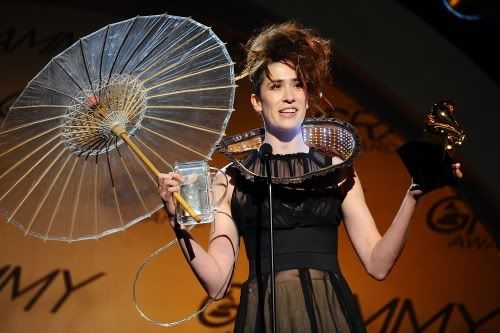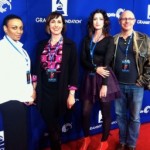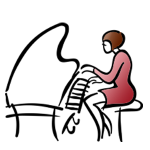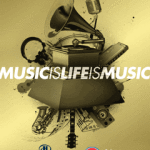A Music Nerd’s work is never done, it seems! I’ve got quite a backlog of items to post, between finishing up my Tales from the GRAMMYS® and writing up several interviews I’ve done lately. Meanwhile, time flies! Do you ever wish you could get the world to stand still, just for a little while, so you could catch your breath? Yeah, me too! 😛
Since I got back from L.A., I’ve had this single sheet of paper floating around my workspace, on which I scribbled a few notes during the Social Media Rock Star Summit that I got to attend during GRAMMY Week. I found a few nuggets of wisdom among my mad jottings, including some that didn’t make it into any other coverage of the event, as far as I can tell, so I’ll share them with y’all now. (See also: my fellow GRAMMY blogger Hard Rock Chick, and LA Weekly.)
Here’s a brief snippet from the session:
The panelists were, indeed, rock stars in the social media firmament:
- Nikhil Chandhok, Product Manager for Syndication at YouTube
- David Karp, founder of Tumblr
- Kevin Rose, founder of Digg
- Pete Cashmore of Mashable
- Jared Leto of 30 Seconds to Mars
Where the Girls Aren’t
 The only thing missing from this esteemed ensemble was… estrogen! For crying out loud, there are women in social media too, people! I can think of at least one who would have been an excellent pick for this session: Imogen Heap, who has made heavy use of social media and technology. Heck, she wore Twitter around her neck while she accepted her GRAMMY for Best Engineered Album!
The only thing missing from this esteemed ensemble was… estrogen! For crying out loud, there are women in social media too, people! I can think of at least one who would have been an excellent pick for this session: Imogen Heap, who has made heavy use of social media and technology. Heck, she wore Twitter around her neck while she accepted her GRAMMY for Best Engineered Album!
 Rick Sanchez, a CNN anchor and self-described “social media evangelist” was the moderator. Now, I am aware that it’s fashionable to make fun of and/or dislike Sanchez, and since part of the Miss Music Nerd Mission is to keep things upbeat and positive, I endeavored to keep an open mind going into the event. He comes across as sort of a lovable goofball much of the time, but he can stick his foot in his mouth in rather extravagant ways on occasion. At one point he was talking about the frustrations of calling customer service lines, and how you’re liable to be connected to “Bobby from India.” If I’d been a panelist, I might have created a diversion at that moment by contriving a sudden coughing fit or water bottle mishap. As it was, all I could do was look at Nikhil Chandhok with the most apologetic expression I could muster.
Rick Sanchez, a CNN anchor and self-described “social media evangelist” was the moderator. Now, I am aware that it’s fashionable to make fun of and/or dislike Sanchez, and since part of the Miss Music Nerd Mission is to keep things upbeat and positive, I endeavored to keep an open mind going into the event. He comes across as sort of a lovable goofball much of the time, but he can stick his foot in his mouth in rather extravagant ways on occasion. At one point he was talking about the frustrations of calling customer service lines, and how you’re liable to be connected to “Bobby from India.” If I’d been a panelist, I might have created a diversion at that moment by contriving a sudden coughing fit or water bottle mishap. As it was, all I could do was look at Nikhil Chandhok with the most apologetic expression I could muster.
Social Media: The 21st-Century Front Porch?
He did make an interesting point in his intro to the discussion, though. He talked about how, 100 years ago, people formed communities of their “front porch.” The development of mass media displaced community interaction to some extent, with its primarily one-way communication. Now, social media is bringing that old-fashioned sense of community into the 21st century. Which is pretty cool.
I’ve seen the argument made that the time we spend engaging with technology is making us more isolated than ever, and I know that I’ve spent many a day glued to the laptop, with a nagging worry in the back of my mind that I’m making myself agoraphobic and courting a vitamin D deficiency. While it’s undoubtedly true that I need to get up and take a walk much more often, I do use that technology to connect with other people (that’s one of the reasons it’s so addictive!). It doesn’t completely replace in-person interaction, of course. But having met many friends in person who I first became acquainted with online (including McDoc! 😀 ), I can attest to the benefits of playing in the online kiddie pool.
The panelists added to this idea. Nikhil Chandhok commented that humans have been telling their stories for thousands of years, and YouTube is another way to do that. Pete Cashmore went as far as to say that the mass media (TV, radio, film) that developed during the 20th century was an aberration, given how it broke down community structures. He also said that when talented people communicate directly with fans, the role of the middleman is called into question.Sanchez asked whether a ‘gatekeeper’ role was necessary, and Cashmore conceded that “You can’t trust everything on the web.” ‘Brand’ is important, and creates a quality and trust filter. (Always make sure you’re getting gen-you-wine Miss Music Nerd content, folks! Accept no substitutes! 😉 )
Kevin Rose gave the example of interview situations where questions come from the audience rather than solely from the interviewer. He said that this results in questions no interviewer in their right mind would ask — for better or worse!
“The industry is becoming more democratic,” Sanchez remarked, and Jared Leto quickly added, “And more anarchistic.” And Pete Cashmore pointed out that what’s popular isn’t always what’s good. As a classical music ambassador, I can heartily agree with that! 😉
Speaking of audience questions, one that came up was whether musicians can be successful going forward without harnessing social media tools. As one might expect, all of the panelists believed that engaging with social media would be critical to success in the future. Kevin Rose opined that with the rise of self-publishing and self-publicizing, the industry is “screwed” if they don’t get on board with social media as well.
The Perennial Problems: Time and Money
Toward the end, two questions were raised that are particularly important to me personally, and there wasn’t sufficient time to address them fully. First, how to us creative types find time to be creative while maintaining the various social media connections and tools? That’s a darn good question that I haven’t answered for myself yet. Every so often over the past month or so, I’ve said to myself, “Wait a minute… I write music, don’t I?” or, “Hey, I’d better play the piano again sometime soon!”
The second is, how do you earn any money in this new online world, where so much content is given away free? As an avid collector of expensive hobbies, I’m certainly no authority on this issue. I’m working on my plan for World Media Domination, though… stay tuned! 😀








With the social networking resources:
Passive or active?
That is, do we lurk and have an account, or do we use that account often to upload our own content?
Glenda Watson Hyatt has been streamlining her content. The place she wants people to go first is her blog.
Good question, Adelaide — I would say active: use the account and upload content, even if that just means, for example, rating and commenting on YouTube videos.
Personally, I post on FB and Twitter regularly, and I watch and share plenty of YouTube videos, but don’t have many videos of my own uploaded… Yet! That’s gonna change in the near future! 🙂
The “Bobby form India” line rmeninded me of the Simspons episode when Mr. Burns oursources to Mumbai. Anyways on a more intellectual level a couple of interesting books with a very contrarian view of the new social media internet world that you might want to check out (and maybe throw across the room) are Mark Halprins “Digital Barbarism” and Andrew Keens “Cult of the Amateur” . Loved the Twitter necklace that Imogene was wearing. Perhaps you could compose a piece using Twitter in some way ?
“Music” and “Industry” are two words that don’t belong together.
Can’t we just get together, rock out, and have fun? Why does everybody have to be so serious about it, and why does commercial music summarily suck? (And why do the artists I know who are the most successful not have record contracts these days?)